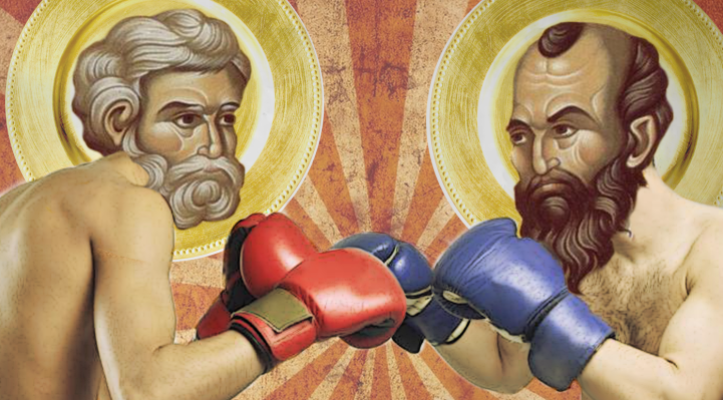Do real Christians disagree or argue? Have you ever disagreed with another Christian?
Christians do argue
Some people think that if two Christians disagree, or argue, it automatically damages the Christian witness. Sometimes Christians feel that they have to choose sides in arguments. What this means is that one party is portrayed as ‘right’ and the other party ‘wrong.’ The ‘wrong’ person or party is therefore somehow not a ‘real’ Christian.
If you’ve read any of these posts you will see that on occasion I have publicly disagreed with statements made by other Christian leaders. Obviously, I feel that I’m right and they’re wrong, but nothing more. It doesn’t mean that they are less Christian than I.
For example, I have disagreed with statements made by Brian Tamaki from Destiny church. I stand by those particular statements. Does this mean I don’t think he is a Christian? No way.
I am fully aware of the good Christian ministry being undertaken by Brian Tamaki and his church. Recently, for example, I have been impressed with the work of ‘Man Up’ (www.manupnz.org) in our communities, and I want to see more of it, especially in our prisons. Because we might disagree on some points, it doesn’t mean I need to trash them.
Even St Paul and St Barnabas argued
Okay, I’m not actually into calling people ‘Saint’, but it helps to make the point. If two giants of the early church like Paul and Barnabas argued, but kept on doing gospel ministry, surely we can too.
After the general assembly in Jerusalem (Acts 15), Paul says to Barnabas, “Let’s go back and see how the believers in the churches we’ve helped to establish are doing.” Barnabas agreed, and suggests taking John Mark, his cousin, with them on the trip.
Paul’s face must have frozen like James Comey’s when  Barnabas said that, and knowing his personality he probably said, “I don’t think it’s a good idea to take the guy who abandoned us in Pamphylia.” Barnabas likely felt offended, because John Mark is whanau or family. They argue back and forth, but can’t agree. Who is right and who is wrong?
Barnabas said that, and knowing his personality he probably said, “I don’t think it’s a good idea to take the guy who abandoned us in Pamphylia.” Barnabas likely felt offended, because John Mark is whanau or family. They argue back and forth, but can’t agree. Who is right and who is wrong?
An irreconcilable difference?
Unlike the church meeting in Jerusalem, Paul and Barnabas can’t resolve this disagreement, so they agree to disagree, as we say. Barnabas takes John Mark and they go back to Cyprus, Barnabas’s homeland, and Paul recruits Silas who was selected by the Jerusalem council to return with Paul and Barnabas to take their letter to the churches. From this point on in Acts, we don’t read any more about Barnabas and Mark.

But, does this mean that their relationship was irreversibly damaged? Because we don’t read about John Mark and Barnabas any more, you could conclude that. However, you do see that Paul still loves and values Barnabas and Mark. In the Corinthians letter, he references Barnabas as one of his fellow workers (1 Cor.9.6). More striking is the way he talks about Mark – this boy he didn’t trust. He tells the Colossian church to welcome Mark (Col.4:10), then Mark is ‘very useful to me for ministry’ (2 Tim.4:11), and then in Philemon he includes Mark in his band sending greetings (Philm.27).
Our personalities
Part of the conflict, I believe came down to personality types and culture clashes. Let’s look at them:
Paul: We know this guy. He was a hard man, passionate and driven. He wouldn’t have been the easiest person to live with, and yet he accomplished a phenomenal amount in his life and ministry. Intelligent, a bit rough around the edges, but the fearless church planter extraordinaire. Where would we be without him?
Barnabas: A Levite (priestly) from Cyprus, who lead by his example of selling property and giving the money to the church. He was the man who vouched for Paul when everyone else in Jerusalem was still scared of him and wouldn’t meet him.

He was also the man who the church trusted to go to Antioch and evaluate the things happening there among the Gentile converts. He earned the name, ‘son of encouragement.’ Remember, it was the Holy Spirit who told the church to ‘set apart for me Paul and Barnabas.’
They were in reality great friends who went way back, but are now unable to see eye-to-eye.
Hope for us all
You might be ‘in an argument’ with another Christian right now, maybe even with someone else in your church. While always seeking to be reconciled and heal any rifts, what is important is that you keep doing what God wants, to tell the world about the death and resurrection of his Son for sinners.






 Barnabas said that, and knowing his personality he probably said, “I don’t think it’s a good idea to take the guy who abandoned us in Pamphylia.” Barnabas likely felt offended, because John Mark is whanau or family. They argue back and forth, but can’t agree. Who is right and who is wrong?
Barnabas said that, and knowing his personality he probably said, “I don’t think it’s a good idea to take the guy who abandoned us in Pamphylia.” Barnabas likely felt offended, because John Mark is whanau or family. They argue back and forth, but can’t agree. Who is right and who is wrong?



